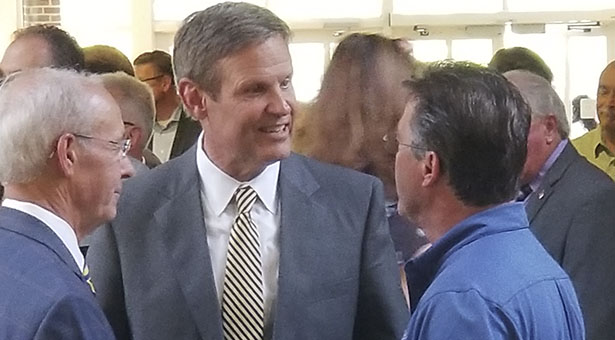Tennessee Governor Bill Lee

Tennessee Governor Bill Lee announced July 16 the funding of a new Center for Rural Health Research to be housed at the East Tennessee State University College of Public Health and directed by Dr. Randy Wykoff, public health dean. The governor pledged the state budget would include $1.5 million for the first year and $750,000 for the center for the next nine years. That gift was more than matched by Ballad Health, when Chairman and CEO Alan Levine announced a $15 million matching gift to the center over the next 10 years.
Lee said ETSU was the perfect place for the center because of the unique make-up of the region. “There are multiple cities, a significant number of rural communities – when you come together and you look at this region as a region, we see opportunity that I think is underutilized and untapped. What that means is there is a great deal of hope for prosperity in this region in ways we haven’t seen before. I have a strong belief in that and hope for it, and a strong commitment from my administration.”
That $22+ million in total funding could amount to seed money for the center if grant applications are successful over the coming decade, Levine said. “(The funding we announced today) is funding for infrastructure. The real benefit from an economic perspective is Dr. Wykoff is going to be out there competing for external grants all over the world. That’s the benefit of this center – in getting partnerships with other universities and other systems. When we go and start competing for competitive grants from the National Science Foundation the National Institute of Health, private grants, it could be tens or hundreds of millions of dollars brought into this region for the purpose of funding various studies and various initiatives. So, the things Ballad is doing will generate interest from outside parties. Until now we really didn’t have the infrastructure to attract that funding. We’ve now given Dr. Wykoff a vehicle to go out there and proactively compete for those dollars. So, the $22 million is a lot of money, but it could pale in comparison to what we might bring in.
“Everyone benefits from a healthy, educated, drug-free workforce,” Wykoff said. “If you don’t have education and health, you can’t bring in new businesses and you can’t grow the businesses that you have. Prosperity, health and education are inseparable.”
“When you have low unemployment and low workforce participation, you can’t get companies to relocate here,” Levine said. “The unemployment rate is as low as it has ever been. So, if Tennessee is going to grow, it’s got to increase its workforce participation. We have to get more people into the workforce, and that’s exactly what Dr. Wykoff is talking about.”
One recent estimate showed around 47,000 northeast Tennesseans who would otherwise be employable outside of workforce participation. Some have addiction problems or education deficits that could be addressed by the work at the Center for Rural Health Research, Levine said. That research will benefit not only this region, but all of Appalachia, and rural America, said ETSU President Dr. Brian Noland. “Appalachia is going to lead in developing solutions to many of the challenges facing our rural communities. This is not a Tennessee problem. It is a national one. I’m pleased that ETSU will lead this academic, research-based effort to solve some of our nation’s most important problems.”




